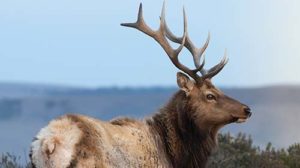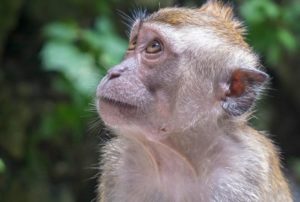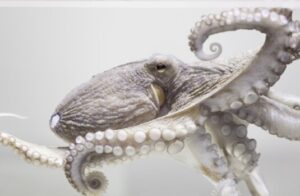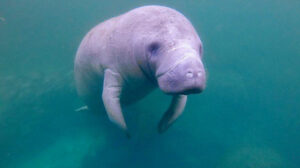Fall 2023 was as productive as ever in the Animal Law & Policy Clinic! With a staff of eight clinicians and two research assistants, the Clinic filed three briefs and three sets of regulatory comments. Students also gained experience with filing public records requests, conducting client meetings, interviewing sources, and conducting legal research. Rebecca Garverman (JD ’21) was promoted to Staff Attorney this fall, and Kelley McGill (JD ’20) joined us for the semester as a Clinical Fellow. We are forever grateful to our founding director, Katherine Meyer, who continued to mentor students throughout the semester and served in an Of Counsel role.
 Advocating for California’s Tule Elk. On behalf of clients Jack Gescheidt, Laura Chariton, and the Animal Legal Defense Fund (ALDF), we filed a final reply brief in the Ninth Circuit Court of Appeals in our case challenging the National Park Service’s failure to update the General Management Plan for Tomales Point, home to a fenced-in population of Tule Elk. The General Management Plan has not been revised since it was adopted over 40 years ago and a fence across Tomales Point currently blocks the elk from migrating to gain access to adequate food and water during periods of drought. The Court of Appeals is considering scheduling an oral argument for Spring 2024.
Advocating for California’s Tule Elk. On behalf of clients Jack Gescheidt, Laura Chariton, and the Animal Legal Defense Fund (ALDF), we filed a final reply brief in the Ninth Circuit Court of Appeals in our case challenging the National Park Service’s failure to update the General Management Plan for Tomales Point, home to a fenced-in population of Tule Elk. The General Management Plan has not been revised since it was adopted over 40 years ago and a fence across Tomales Point currently blocks the elk from migrating to gain access to adequate food and water during periods of drought. The Court of Appeals is considering scheduling an oral argument for Spring 2024.
Our brief, drafted by clinicians Magdalene Beck (3L), Nyala Carbado (2L), and Samantha Goerger (2L) under the guidance of Rebecca Garverman and Kathy Meyer, demonstrates that the Park Service has a mandatory duty to revise the General Management Plan under its organic statute, which provides that the Park Service “shall” revise all General Management Plans for national park units.
In response to our lawsuit and other advocacy efforts, the Park Service announced a proposal to remove the elk fence as part of the public scoping effort for its Tomales Point Area Plan. In September, we submitted comments in support of the proposal, urging the Park Service to continue to provide supplemental water to the elk for the next couple of seasons and to remove cattle operations from the Point Reyes National Seashore. Research assistant Hallie Aylesworth (3L) and clinician R. Elliott DeRiso (3L) prepared the submission with Rebecca Garverman and Kathy Meyer.
 Litigating for Primates in Labs. The government appealed our spectacular victory in a lawsuit filed on behalf of Rise for Animals and ALDF challenging the U.S. Department of Agriculture’s (USDA) denial of our clients’ petition to improve standards for the psychological well-being of primates under the Animal Welfare Act (AWA). This semester, the Clinic filed its responsive brief—drafted by clinicians Aimee Cicchiello (2L) and Allyson Gambardella (3L) with the oversight of Rebecca Garverman and Kathy Meyer—in the Fourth Circuit Court of Appeals.
Litigating for Primates in Labs. The government appealed our spectacular victory in a lawsuit filed on behalf of Rise for Animals and ALDF challenging the U.S. Department of Agriculture’s (USDA) denial of our clients’ petition to improve standards for the psychological well-being of primates under the Animal Welfare Act (AWA). This semester, the Clinic filed its responsive brief—drafted by clinicians Aimee Cicchiello (2L) and Allyson Gambardella (3L) with the oversight of Rebecca Garverman and Kathy Meyer—in the Fourth Circuit Court of Appeals.
Our brief responds to the government’s disingenuous argument that the district court “misconstrued” the USDA’s denial letter, which rested on a demonstrably false statement that USDA inspectors inspect “all areas of care and treatment that are covered” by the AWA. In fact—as revealed by documents obtained by the Clinic under the Freedom of Information Act—prior to denying the petition the USDA secretly instituted a new policy that prohibits inspectors from doing complete inspections of certain research facilities.
The Clinic also filed its second summary judgment brief in a related case challenging the USDA’s secret inspection policy as arbitrary, capricious, and not in accordance with law. The brief, drafted by clinicians Magdalene Beck (3L) and Jonathan Smith (2L) with Rebecca Garverman and Kathy Meyer, responds to the USDA’s argument that its truncated inspection policy is necessary due to the agency’s “limited resources.” The brief demonstrates that limited resources are not an excuse for violating the plain language of the AWA, and that the agency’s own Congressional budgetary requests undermine its own arguments: in the same year that the USDA instituted its truncated inspection policy, it requested less funding for its inspection program.
Taking action for invertebrates. Partly in response to complaints filed by the Clinic on behalf of clients For the Fishes, Pono Advocacy, and Mike Nakachi, Hawaiian authorities shuttered the Kanaloa Octopus Farm (KOF), which exploited dozens of wild-caught octopuses for tourist interactions and captive breeding experiments. Public records obtained by clinicians Kira Horowitz (3L) and Jonathan Smith revealed that one agency claimed to be under “severe strain” because of the “considerable controversy over animal welfare and wildlife exploitation” that had “resulted in significant public opposition” to the octopus farm.
 In October, the Clinic submitted written testimony to Hawaii’s Division of Aquatic Resources (DAR) on proposed amendments to Hawaii’s aquaculture license regulations. The testimony to DAR, authored by Kelley McGill, recommended adding language to require licensed aquaculturists to submit health and fatality reports, demonstrate their ongoing ability to keep aquatic life healthy and alive, and provide access for inspection of their facilities. This language would strengthen the Division’s ability to assess facilities such as KOF, which reportedly was unable to keep octopus paralarvae alive.
In October, the Clinic submitted written testimony to Hawaii’s Division of Aquatic Resources (DAR) on proposed amendments to Hawaii’s aquaculture license regulations. The testimony to DAR, authored by Kelley McGill, recommended adding language to require licensed aquaculturists to submit health and fatality reports, demonstrate their ongoing ability to keep aquatic life healthy and alive, and provide access for inspection of their facilities. This language would strengthen the Division’s ability to assess facilities such as KOF, which reportedly was unable to keep octopus paralarvae alive.
In December, the Clinic submitted a detailed written comment to the National Institutes of Health (NIH) in response to a request for information regarding its proposed guidance for the care and use of cephalopods in research. The comments were submitted on behalf of a coalition that included many of the signers of a petition the Clinic submitted to the NIH in 2020 and reiterated our call for the NIH to amend its policy governing the use of animals in research to include cephalopods. The comments also outlined ways to strengthen and expand the proposed guidance. Hallie Aylesworth and Jonathan Smith worked on the comments with Kelley McGill, alongside the Humane Society of the United States and the Humane Society Legislative Fund.
 Making progress for manatees. In response to a petition filed by the Clinic and the Center for Biological Diversity, Miami Waterkeeper, Save the Manatee Club, and Frank S. González García, the U.S. Fish and Wildlife Service announced on October 12, 2023, that there is “substantial” scientific evidence to conclude that the West Indian manatee may be in danger of extinction—the first step to changing the species’ status to “endangered” under the Endangered Species Act, which would provide these animals the maximum protection of the law. Research assistant Savannah Bergeron (3L) worked on the petition in previous semesters alongside other Clinic alumni.
Making progress for manatees. In response to a petition filed by the Clinic and the Center for Biological Diversity, Miami Waterkeeper, Save the Manatee Club, and Frank S. González García, the U.S. Fish and Wildlife Service announced on October 12, 2023, that there is “substantial” scientific evidence to conclude that the West Indian manatee may be in danger of extinction—the first step to changing the species’ status to “endangered” under the Endangered Species Act, which would provide these animals the maximum protection of the law. Research assistant Savannah Bergeron (3L) worked on the petition in previous semesters alongside other Clinic alumni.
Opposing Animal Poisons. Three clinicians—R. Elliott DeRiso, Samantha Goerger, and Magdalene Beck—also worked on a major project related to rodenticides, which cause animals to die slowly of internal bleeding and lead to numerous secondary poisonings of predators and scavengers. These poisons are responsible for the deaths of high-profile animals such as MK, a bald eagle found suffering in an Arlington, Mass., cemetery earlier this year.
More to come! We worked on a variety of additional projects to advance the interests of animals killed for human convenience, used in research, and exploited for entertainment, but we cannot yet discuss them publicly. Stay tuned for big developments this spring!
We are so grateful for the contributions of every student and the entire Clinic and Brooks McCormick Jr. Animal Law & Policy Program team: Clinical Assistant Marina Apostol, Research Assistants Savannah Bergeron and Hallie Aylesworth, Intern Aria Nimmagadda, Professor Kristen Stilt, Executive Director Nirva Patel, Communications Director Sarah Pickering, and Program Administrator Ceallaigh Reddy. Thanks also to our wonderful clients, collaborators, guest speakers, and experts who have graciously shared their time and knowledge with our students. And of course, our work would not be possible without the generosity of funders whose support ensures that the Clinic will continue to train the next generation of animal lawyers.
For all animals,
Rachel Mathews, Acting Director

